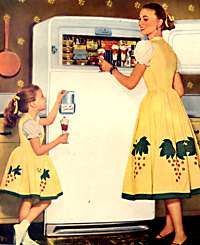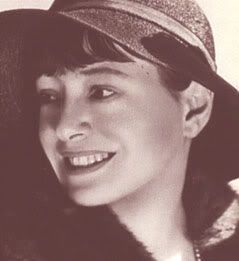So many times I have opined like Morticia in "Adams Family Values":
I'm just like every modern woman trying to have it all. A loving husband, a family. I only wish I had more time to seek out the dark forces and join their hellish crusade.
In other words I want to be Caitlin Flanagan. I want to be the kind of stay-at-home mom who has a full staff, so that I have more time for idle pursuits like being published in prestigious magazines and locking down book deals. If I don't get a nanny soon to take my daughter to the park and bandage her scraped knees, I'm not sure I can even give this little blog my all.
 For example I've been trying to write this entry for three days but the laundry was piling up, the kitchen counters needed a good bleaching, and don't even get me started on the Sisyphean effort of loading and unloading the dishwasher. All that and my child actually requires meals on occasion. No really. She does. The demands of motherhood are manifold.
For example I've been trying to write this entry for three days but the laundry was piling up, the kitchen counters needed a good bleaching, and don't even get me started on the Sisyphean effort of loading and unloading the dishwasher. All that and my child actually requires meals on occasion. No really. She does. The demands of motherhood are manifold.I was going to chuck the idea and gaffe off the furor surrounding Flanagan's newest collection of essays, "To Hell With All That: Loving and Loathing Our Inner Housewife." But then I saw her on the "Colbert Report" last night. What can I say except, OH MY GOD! I LOVED HER SHOES!! A delicious little pair of fuck-me pumps that reminded me, once again, of the important things in life. Things like nurturing children, supervising the baking of cookies, and giving my loving breadwinner a proper schtupping.
My husband makes a decent living and I don't have to consider a "real" job. Being a woman of letters isn't real work, of course, but it is a little time consuming. To properly undertake such leisurely pursuits does require a support system of some kind.
Caitlin Flanagan has renewed my hope and inspiration. There's just no reason any relatively attractive woman can't have it all: a wealthy husband, a lovely home, a maid, a nanny, a little writing hobby, a contributing editorship, and the opportunity to flirt shamelessly with Stephen Colbert on national television. The rewards of traditional values are more than worth the sacrifices.
There are those, like Joan Walsh of Salon, who claim Flanagan is a tad hypocritical and manipulative.
Everyone knows Caitlin Flanagan isn't a stay-at-home mother, she's an accomplished writer who plays a stay-at-home mom in magazines and on TV. Right? Part of why I've never gotten upset about Flanagan's pro-hearth and home shtick is that I've seen it as just that, shtick. I'd read enough to know she had a full-time nanny when her twin sons were infants and she was trying to be a novelist; then she wrote about modern womanhood and family life for the Atlantic Monthly after they hit preschool; now, with her boys in grade school, she's got a great gig at the New Yorker. So how is she not a career woman who's also a mom?
I've been too busy to figure it out, since I am a career woman who's also a mom. I haven't always found time to read Flanagan's glossy essays, although I know I should, since she drives some feminist writers I admire to fits. Not me, I always said, with (dare I confess?) a semi-secret, Flanagan-like flash of self-satisfaction: I would never judge those women who are driven nuts by Flanagan, but maybe I'm just a little wiser, a little more secure in my choices, just a bit harder to rattle than they are, the poor dears.
Then I picked up Flanagan's new book, "To Hell With All That: Loving and Loathing Our Inner Housewife," and I lost my equanimity. It's mostly a lightly reworked compilation of her New Yorker and Atlantic Monthly essays from the last few years, but dressed up with a more-in-sorrow-than-in-anger introduction blaming feminism for causing women "heartache," and a truly below-the-belt conclusion, on how surviving breast cancer confirmed Flanagan's conviction that traditional marriage and motherhood is best. I put the book aside for almost two months because even though I'm tough, I'm not tough enough to kick someone with cancer, and Flanagan deserves a kick for the dishonest and divisive gloss these new essays give the book, and her whole career. But I guess I learned something new about myself in this process: Apparently I am tough enough to kick someone with cancer, but only after feeling bad about it for a while.
One bitter feminazi even went so far as to insist that the lovely Flanagan is pulling off an even more massive deception:
Sorry to be a spoiler - and, really, that woman they hired for the author photo is gorgeous - but I finally get it: Caitlin Flanagan is actually a man! She had me going there for a while with the whole "woe is men" thing: Surely they should suffer less nagging about lunch and laundry and enjoy more conjugal hokey-pokey, right?
A profile in Elle makes her look vicious:
Driving to meet Flanagan, I call home to Brooklyn and learn that our gerbil has just died. My elder girl is a little sad, my babysitter tells me, but doing okay. My younger, barely two, doesn't know the difference. I feel a twinge of guilt for not being there, and it's the first thing I mention once Flanagan and I settle in to talk in the sunroom of her large, gracious home in L.A.'s affluent Hancock Park. What will she say, this woman who insists that children suffer if their mother works at all, who loved teaching high school English but wouldn't think of returning until her twin boys, eight years old, are in college "because I would never be away from my kids"?
"She'll grow from it," Flanagan says winningly. "Your daughter will grow from her gerbil dying while you're not there." There isn't a hint of disingenuousness in her voice; indeed, she's so earnest I worry that I've exaggerated "Gerby's" place in our hearts. Maybe she's different in person than on paper….
Midway through the interview in her home, I say that I noticed she removed the most searing line from her revised "Serfdom" essay: "When a mother works, something is lost." So, I ask her, do you stand by that line? "Yeah," Flanagan says, her voice now soft, serious. "The gerbil's dead, and you're here."
It's not surprising that Flanagan pushes buttons. Even I winced just a little at her enthusiastic agreement with Colbert's nostalgic reference to the good old days when women who declined sex with their husbands were labeled crazy and lobotomized. But I'm sure she was just being her playful, kittenish self. And I did love her shoes.









0 comments:
Post a Comment